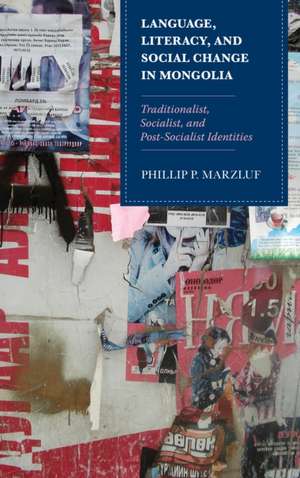Language, Literacy, and Social Change in Mongolia: Contemporary Central Asia: Societies, Politics, and Cultures
Autor Phillip P. Marzlufen Limba Engleză Hardback – 30 noi 2017
Language, Literacy, and Social Change in Mongolia is the first full-length treatment of literacy in Mongolian. Challenging readers' assumptions about Central Asia and Mongolia, this book focuses on Mongolians' experiences with reading and writing throughout the past 100 years. Literacy, as a powerful historical and social variable, shows readers how reading and writing have shaped the lives of Mongolians and, at the same time, how reading and writing have been transformed by historical, political, economic, and other social forces. Mongolian literacy serves as an especially rich area of inquiry because of the dramatic political, economic, and social changes that occurred in the twentieth and twenty-first centuries. For the seventy years during which Mongolia was a part of the communist Soviet world, literacy played an important role in how Mongolians identified themselves, conceived of the past, and created a new social order. Literacy was also a part of the story of authoritarianism and state violence. It was used to express the authority of the communist Mongolian People's Revolutionary Party, control the pastoral population, and suppress non-socialist beliefs and practices. Mongolians' reading and writing opportunities and resources were tightly controlled, and the language policy of replacing the traditional Mongolian script with the Cyrillic alphabet immediately followed the violent repression of Buddhist leaders, government officials, and intellectuals. Beginning with the 1990 Democratic Revolution, Mongolians have been thrust into free-market capitalism, privatization, globalization, and neoliberalism. In post-socialist Mongolia, literacy no longer serves as the center for Mongolian identity. Government subsidies to pastoral literacy resources have been slashed, and administrators now find themselves competing with other "developing countries" for educational funding. Due to the pressures caused by globalization, Mongolians have begun to talk about literacy and language in terms of crisis and anxiety. As global flows of English compete with new symbols from the distant past, Mongolians worry about the perceived lowering standards of Mongolian linguistic usage amid rapid economic changes. These worries also reveal themselves in official language policies and manifest themselves in the multiple languages and scripts that appear in the capital of Ulaanbaatar and other urban areas.
Din seria Contemporary Central Asia: Societies, Politics, and Cultures
- 19%
 Preț: 514.71 lei
Preț: 514.71 lei - 19%
 Preț: 674.98 lei
Preț: 674.98 lei -
 Preț: 399.58 lei
Preț: 399.58 lei - 23%
 Preț: 688.08 lei
Preț: 688.08 lei -
 Preț: 377.06 lei
Preț: 377.06 lei -
 Preț: 433.58 lei
Preț: 433.58 lei - 27%
 Preț: 718.37 lei
Preț: 718.37 lei - 27%
 Preț: 846.92 lei
Preț: 846.92 lei - 27%
 Preț: 716.27 lei
Preț: 716.27 lei - 23%
 Preț: 685.09 lei
Preț: 685.09 lei - 27%
 Preț: 1026.59 lei
Preț: 1026.59 lei - 23%
 Preț: 647.76 lei
Preț: 647.76 lei - 23%
 Preț: 685.98 lei
Preț: 685.98 lei -
 Preț: 488.76 lei
Preț: 488.76 lei -
 Preț: 388.08 lei
Preț: 388.08 lei - 27%
 Preț: 679.67 lei
Preț: 679.67 lei - 23%
 Preț: 589.13 lei
Preț: 589.13 lei -
 Preț: 351.87 lei
Preț: 351.87 lei - 27%
 Preț: 755.64 lei
Preț: 755.64 lei - 27%
 Preț: 683.22 lei
Preț: 683.22 lei -
 Preț: 396.30 lei
Preț: 396.30 lei - 27%
 Preț: 855.84 lei
Preț: 855.84 lei - 27%
 Preț: 788.11 lei
Preț: 788.11 lei -
 Preț: 386.17 lei
Preț: 386.17 lei - 27%
 Preț: 816.44 lei
Preț: 816.44 lei - 27%
 Preț: 795.17 lei
Preț: 795.17 lei - 27%
 Preț: 699.63 lei
Preț: 699.63 lei -
 Preț: 402.55 lei
Preț: 402.55 lei -
 Preț: 315.47 lei
Preț: 315.47 lei - 23%
 Preț: 537.18 lei
Preț: 537.18 lei
Preț: 684.64 lei
Preț vechi: 889.15 lei
-23% Nou
131.00€ • 137.15$ • 108.40£
Carte tipărită la comandă
Livrare economică 05-19 aprilie
Specificații
ISBN-10: 1498534856
Pagini: 252
Dimensiuni: 152 x 229 x 20 mm
Greutate: 0.49 kg
Editura: Rowman & Littlefield
Seria Contemporary Central Asia: Societies, Politics, and Cultures
